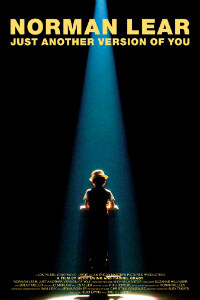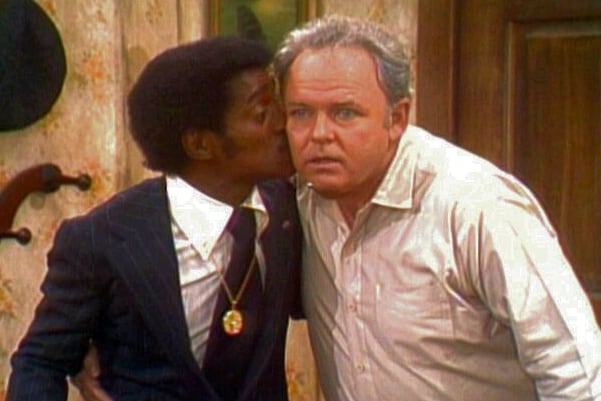
Directed by Rachel Grady & Heidi Ewing
USA, 2016
Legend is a term that gets thrown around a lot in Hollywood. Any actor/actress with a charming smile, a great head of hair, who can survive in Hollywood’s shark infested waters long enough, will eventually get slapped with the term legend. There are also those who the term legend simply doesn’t do justice, individuals whose artistic influence extends well outside the radius of the entertainment industry. Norman Lear is one such man.
If you aren’t familiar with the name Norman Lear, you can guarantee that your favorite actors, writers, directors, and producers are. Lear ushered in a golden age of socially progressive television: Good Times, The Jeffersons, Maude, and All in the Family are some of the crown jewels in his extensive resume. Had any show-runner developed just one of these series, their name would enter into the pantheon of all-time greats; at Lear’s peak, he was responsible for six of the top ten shows airing on television.
Norman Lear: Just Another Version of you focuses on Lear’s expansive career as well as his private life. Lear is the film’s central figure — not by way of archival footage either, the 93 year old Lear is still alive and kicking. Lear stars in the film, he’s there to chaperon the audience through the most significant events in a life that’s teeming with them. Lear’s story is rooted back in his childhood in New York, where he grew up as the poor son of a convicted criminal. The film discusses how living in the New York City melting pot helped plant seeds of empathy for other cultures. Lear would later on channel that compassion for people that were “different” into his socially conscious work. The film then briefly touches upon his early writing career, working with industry legends, Dean Martin and Jerry Lewis, before honing in on his string of success in the 1970’s. In addition to the clips from classic shows and archival footage, there are also segments featuring the then 92-year old Lear spending time with family and friends.
Norman Lear: Just Another Version of You features interviews with a number of celebrities, each of whom gush over Lear’s career. Rob Reiner, Amy Poehler, and George Clooney each take a moment to discuss the significance of Lear’s work and how it has affected them. While the interviewees all do a solid job explaining what makes him such an important figure, former Daily Show host, Jon Stewart, sums up Lear’s influence with laser accuracy. Stewart points out that Lear helped people learn to “process complex thoughts through the lens of comedy.” Lear’s progressive shows shined a spotlight on social issues at a time when everything else on TV turned a blind eye.
Under the veil of comedy, Lear’s TV shows unleashed complex moral discussions upon American audiences. The film points to Maude’s (starring Bea Arthur) infamous abortion episode as a prime example. In 2016, the execs behind TV’s top shows are ecstatic to pull 20 million viewers. Maude’s abortion episode pulled in 65 million viewers and received 17,000 letters. Abortion is still a hot button issue today, and if you go back and watch Lear’s other programs; Good times; The Jeffersons; All in the Family; you will see that Maude wasn’t his only topically prescient series. Lear’s shows tackled many of the issues in today’s headlines (gun violence, gas prices, underemployment) back in the 1970’s.
There is a scene in the documentary where the film’s producers show Lear a clip from All in the family. Even when it’s viewed out of context, the segment is powerful. The scene presents Archie Bunker (Carroll O’Connor) firing off one of his famous tirades. Archie Bunker is best known as an emotionally callous bigot, but as the scene goes on, it peels back his layers of rage and resentment, exposing the deeply wounded man at his core. The scene combines a phenomenal script with a masterful performance by O’Connor. When the film cuts back to Lear, he’s sitting still, transfixed on the screen with tears running down his face. Watching a Hollywood figure moved to tears by their work should seem self-congratulatory, like someone patting themselves on the back; not Lear. The film does an excellent job making the viewer believe Lear is not a guy playing the man of the people role. Watching the film, one gets the sense that Lear truly is just another version of all of us.
Norman Lear: Just Another Version of You is must-see viewing for anyone that gives a damn about television history. The film offers an insightful examination of one of entertainment’s most illustrious careers. Just Another Version of You is that special kind of documentary that is as informative as it is fun to watch — Lear’s insights into life at 93 are inspiring enough to keep me from dreading growing old (almost). If you love television, if you are curious about television history, or if you are considering a career in entertainment, doing your homework on Norman Lear is essential. Many icons have come along and changed the entertainment industry; Norman Lear changed the entertainment industry for the better.




